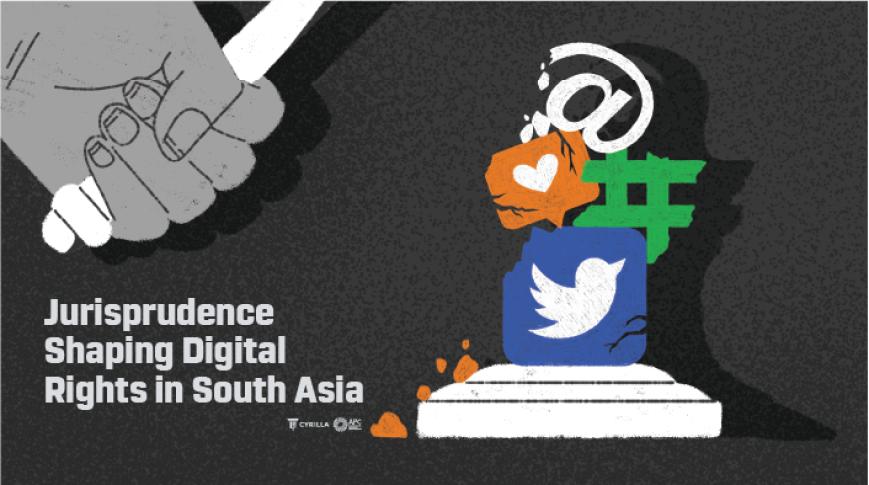
Jurisprudence developed by courts are central to the understanding, application and implementation of laws. Information and communication technologies (ICTs) have irreversibly impacted every walk of personal and public life, including how courts function and deliberate on rights. Given the number of ICT specific laws and policies that have developed, in some cases hastily, over the past decade, the views of courts are ever more important. The rise of the internet and its impact on governments and governance processes has caused states to ring in various laws and extend offline regulations to online spaces. We have been faced with challenges that existed in our societies prior to the internet, but now, the forms they take and the speed of proliferation of content is unimaginable.
This is further complicated in regions which are inhabited by large populations of diverse linguistic, ethnic and religious groups. South Asia, which shares a broad history of colonisation and current socio political and economic challenges, has much to contribute to the evolution of the internet and its governance. Therefore, the study focuses on the South Asian sub-region and explores selected cases relating to digital rights from Bangladesh, India, Nepal, Pakistan and Sri Lanka.
The objective of this report is to make available a resource that can be used by lawyers, policy experts and civil society to gauge the trajectory of judicial discourse on digital rights and use this as a tool to advocate for greater protections. This is not a compendium of all cases relating to the topics dealt with. For studying the cases, the researchers developed a workbook that collated decisions available in online databases including CYRILLA and the Columbia University’s Global Freedom of Expression database. Resources developed by national groups on the state of digital rights in their countries provided critical guidance. The cases selected naturally fell into three categories of access, privacy and freedom of expression.
A key challenge faced, while developing this research, relates to collection of data. In many of the countries (except India), case laws are not easily available on free, open and searchable case lawdatabases. Judgements and orders are often not available or are difficult to access on official court websites. In some countries, many of the decisions or orders relating to digital rights were not reported and thus were inaccessible. In a few instances, particularly for Nepal and Pakistan, some judgements were not available in English and reliance had to be placed on the analysis of the judgement provided by researchers with knowledge of the local language. The countries selected share similar legal systems and challenges in the exercise and enjoyment of digital rights. Some of the issues covered by the report include discussions around access to the internet and its impact on other rights as well as network shutdowns. Judicial pronouncements in relation to privacy, surveillance, national identity programmes, data protection have been analysed across jurisdictions. A significant number of cases studied related to challenges surrounding freedom of expression.
Judgements on access to the internet indicate that there is some recognition of the central role the internet and connectivity play in the lives of all individuals. Cases discussed in this report include judgements relating to equitable telecast rights, instances where use of mobile phones were prohibited, providing limited internet access to prisoners, recognition of medium of information being protected and multiple cases on network shutdowns. However, judgements on internet shutdowns have varied in terms of decisions on procedural propriety, legality and ultimately in providing actual remedy to the people most affected by it. Despite the developing jurisprudence on network shutdowns, ground realities remain unchanged with repeated imposition of disruptions in the region.
Decisions relating to privacy dealt with fundamental questions of whether privacy is protected as a constitutional or fundamental right, validity and regulation of state surveillance mechanisms, data protection and privacy concerns relating to national identity programs. The cases examined included advisory opinions and pronouncements on the right to privacy as a fundamental right, disclosure of personal information, tapping of phone conversations, surveillance of voice and text messages in communications and the validity of the national identity programme in India.
While there is broad recognition for the principles evolved around freedom of expression, courts have largely ruled in favour of censorship and criminalisation. Even in cases where the courts have shunned state action, reparations have not been made available to petitioners in an adequate manner. Fear of uncertainty is pushing intermediaries to proactively takedown content that is under dispute. Cases discussed in the report relate to state powers and validity of blocking; restrictions and criminalisation of political, artistic and sexual expression; the use of blasphemy provisions to criminalise speech; actions to curb hate speech online; use of defamation and contempt of court provisions against speech online and directions on intermediary action or liability.
Overall, courts have been more deferential to state power and concerns of national security or public order over defending individual and fundamental freedoms. However, important jurisprudence has also emerged from the region limiting the power of governments to the imposition of network shutdowns, legality of vague provisions governing freedom of expression and the need for robust data protection mechanisms. South Asian courts have also developed strong jurisprudence delineating the scope of fundamental rights to privacy and freedom of expression and have made it clear that these constitutional protections apply to the online realm. It is hoped that these landmark cases are merely laying the groundwork for the development of robust jurisprudence upholding digital rights and holding states accountable for violating these rights.